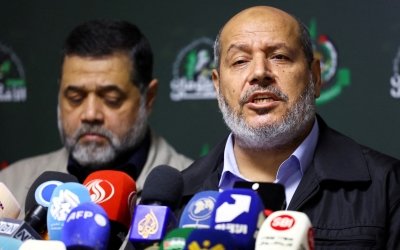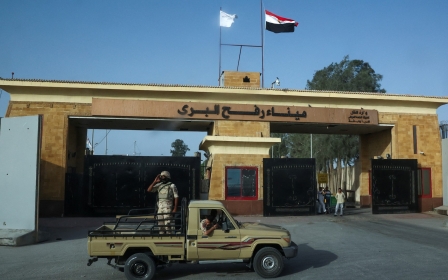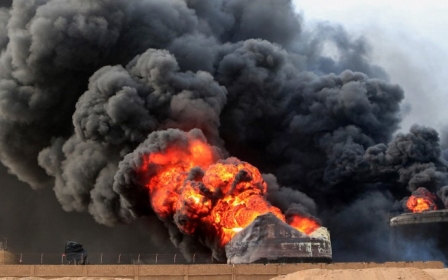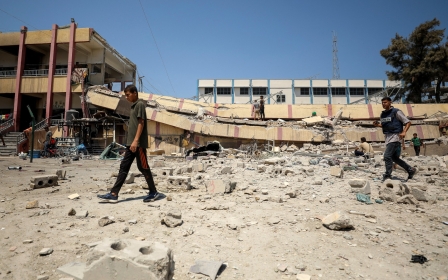War on Gaza: US criticises Netanyahu's 'maximalist' ceasefire stance
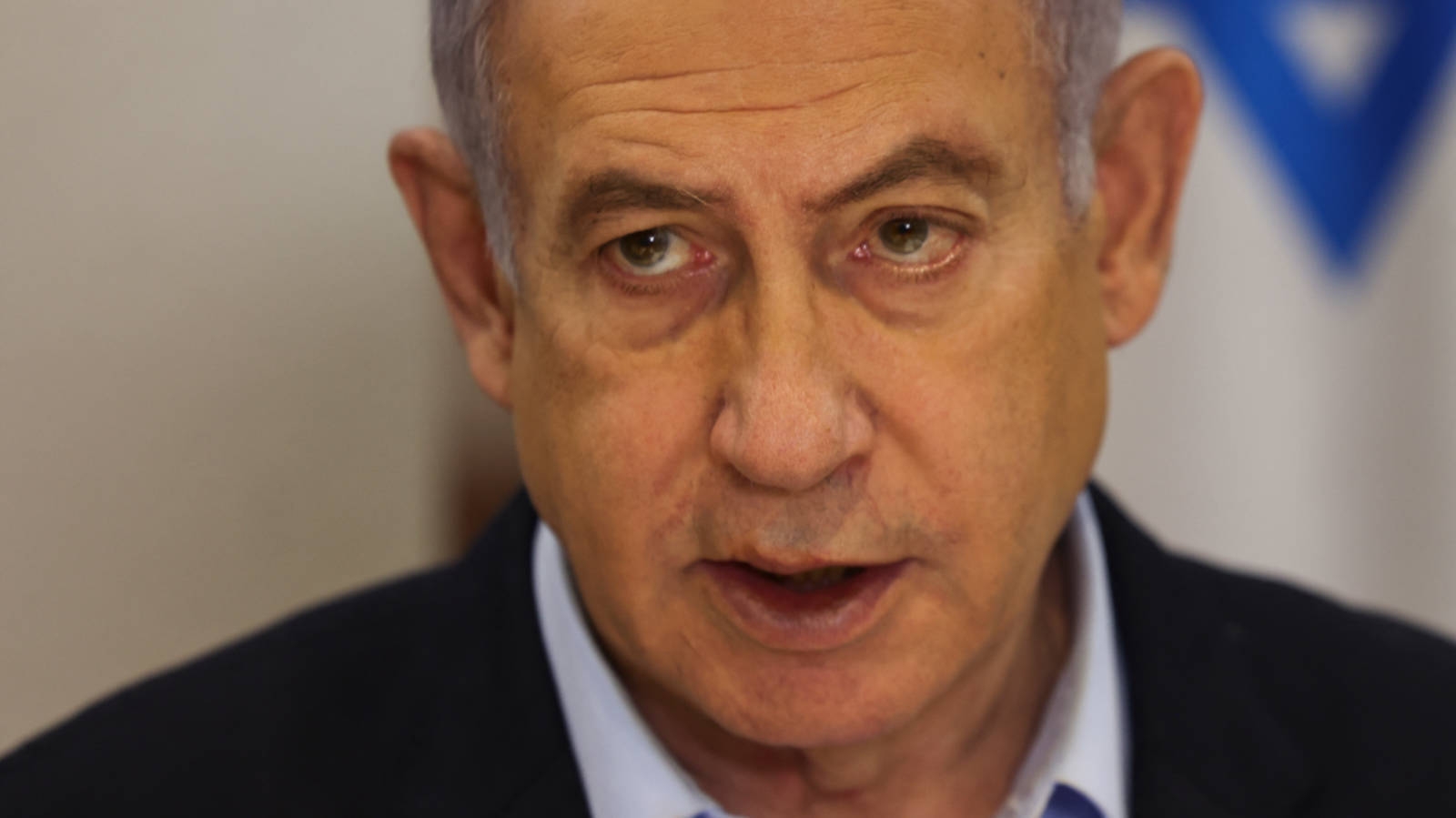
A senior US official has criticised Israeli Prime Minister Benjamin Netanyahu for making "maximalist statements" that are "not constructive to getting a ceasefire deal across the finish line".
The rebuke, issued by the senior US official travelling with US Secretary of State Antony Blinken as he tours the Middle East, came after Netanyahu reportedly assured hardline relatives of Israeli captives held in Gaza that "Israel won't leave the Philadelphi Corridor and the Netzarim Corridor under any circumstances."
The Philadelphi Corridor is a 14km-long, 100m-wide demilitarised buffer zone along the border between Gaza and Egypt, established by two Egyptian-Israeli agreements in 1979 and 2005.
The Netzarim Corridor, a 7km stretch of land dividing northern and southern Gaza, was established by the Israeli military during the current war on Gaza, and named after an Israeli settlement that once sat on the coastal route when Israel had settlements in the enclave.
Netanyahu has repeatedly vowed that Israel will retain control over these areas and maintain a military presence at the Rafah border crossing, a crucial lifeline for aid and commercial goods that has been closed since early May.
New MEE newsletter: Jerusalem Dispatch
Sign up to get the latest insights and analysis on Israel-Palestine, alongside Turkey Unpacked and other MEE newsletters
Earlier this week, Israeli negotiators reportedly informed the prime minister that his insistence on maintaining a presence in the Philadelphi Corridor was the main obstacle to a ceasefire deal.
"We saw the prime minister's comments," the senior official told Israeli media on condition of anonymity. "We're certainly not going to negotiate in public but what I can say is that the only thing Secretary Blinken and the United States are convinced of is the need for getting a ceasefire proposal across the finish line."
"We fully expect that… if Hamas were also to also accept this bridging proposal, discussions will continue on some of the more technical... details," the official said.
"I would also just add that maximalist statements like this are not constructive to getting a ceasefire deal across the finish line and they certainly risk the ability of implementing level, working level and technical talks to be able to move forward when both parties agree to a bridging proposal," they added.
The senior official’s remarks followed a round of talks on Tuesday between Blinken and Egyptian President Abdel Fattah el-Sisi in the coastal city of el-Alamein.
According to a statement issued by the Egyptian presidency, Sisi warned Blinken of the risk that Israel's war on Gaza could expand regionally in ways "difficult to imagine" and stressed that "the time has come to end the ongoing war".
"The ceasefire in Gaza must be the beginning of broader international recognition of the Palestinian state and the implementation of the two-state solution, as this is the basic guarantor of stability in the region," Sisi was quoted as saying.
Earlier this week, three senior Egyptian sources told Middle East Eye that Egypt and Israel had reached an understanding that would allow for an Israeli security presence along the Philadelphi Corridor.
According to the sources, one option is for Israel to maintain boots on the ground. The alternative is to replace the troops with an underground barrier, electronic monitoring equipment and occasional patrols.
The officials told MEE that Egypt would agree to these options if Palestinian factions, particularly Hamas, supported them.
Deviated proposal
On Monday, Blinken held talks lasting three hours with Netanyahu and later said that the Israeli premier had accepted Washington’s "bridging proposal", which aims to address key issues and bring Israel and Hamas closer to a ceasefire deal.
Blinken told the BBC that the bridging proposal included a "detailed plan" for the withdrawal of Israeli soldiers from Gaza.
"The agreement is very clear on the schedule and locations of IDF [Israeli army] withdrawals from Gaza and Israel has agreed to that," Blinken said.
When asked about Netanyahu's claim that he had "convinced" Blinken to keep troops in Gaza, Blinken responded: "I can't speak to what he's quoted as saying. I can just speak to what I heard from him directly yesterday [Monday] when we spent three hours together."
"[That included] Israel's endorsement of the bridging proposal and thus the detailed plan. And that plan, among other things, includes a very clear schedule and locations for withdrawals."
When asked if the proposal called for a "full withdrawal", Blinken said he would not comment.
On Tuesday, sources close to Hamas told MEE they would not engage with the latest US ceasefire proposal because it deviates from President Joe Biden's outline announced in May.
The sources said the new proposal, discussed in Qatar last week, differed from what Hamas had previously agreed to and included additional demands from Netanyahu that Hamas found unacceptable.
Hamas issued a statement on Tuesday reaffirming its commitment to the 2 July proposal, based on Biden’s announcement on 31 May.
The group described the new proposal as a "reversal" of previous US-backed plans and "an American submission to the terrorist Netanyahu’s new conditions and his criminal plans towards the Gaza Strip".
The previous ceasefire plan included a three-phase roadmap to end the war, including the complete withdrawal of Israeli troops from Gaza and the release of all Israeli captives in exchange for Palestinian prisoners.
According to Palestinian officials, at least 40,173 people have been killed and 92,857 wounded in Israel’s war on Gaza. An estimated 1,139 people were killed in Israel during the Hamas-led attacks on 7 October and more than 200 were taken captive.
Middle East Eye delivers independent and unrivalled coverage and analysis of the Middle East, North Africa and beyond. To learn more about republishing this content and the associated fees, please fill out this form. More about MEE can be found here.



